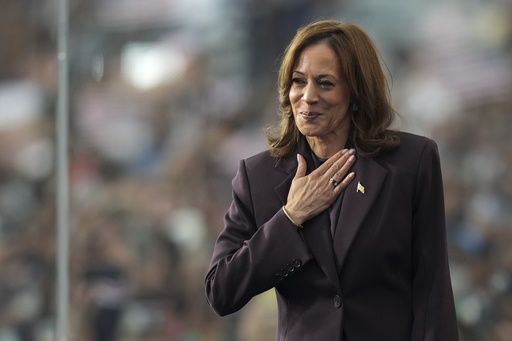
WASHINGTON — In this year’s presidential campaign, inflation and immigration were significant topics, but many voters were also deeply concerned about the state of democracy. According to a survey of over 120,000 voters nationwide, nearly half of participants cited democracy as the most critical reason for their vote, surpassing concerns about inflation, the U.S.-Mexico border crisis, abortion rights, or free speech.
Supporters of both major candidates had differing viewpoints on democracy’s role in their voting decisions. Approximately two-thirds of voters backing Democratic Vice President Kamala Harris prioritized the future of democracy as their primary voting concern. For them, the potential threats posed by Donald Trump were paramount, prompting Harris to label him a danger to the country’s foundational principles as her campaign concluded. Additionally, she characterized him as having authoritarian tendencies.
This perception was echoed by former Trump administration officials who voiced concerns regarding his capability to serve in office. Trump’s refusal to concede and the events that unfolded on January 6, 2021, when he encouraged his followers to storm the Capitol, have raised alarms about the health of American democracy. On the other hand, supporters like Audrey Wesley from Minneapolis pointed out Trump’s legal troubles and perceived lawlessness as crucial determinants in their support for Harris. Wesley expressed serious apprehensions regarding Project 2025, a Republican strategy outline, noting that Trump’s unfamiliarity with it was troubling.
Conversely, Trump voters also expressed concerns for democracy but interpreted those fears through a different lens. About one-third of his supporters recognized democracy as the most pressing issue that influenced their vote, emphasizing their apprehension regarding Harris’s potential presidency, which they viewed as a threat to democratic principles. The survey revealed that both Harris and Trump voters share worries about the extremities of each other’s positions, with approximately 90% of Harris voters concerned Trump would lead the country toward authoritarianism, while around 80% of Trump supporters felt similarly about Harris.
Debbie Dooley, a 66-year-old co-founder of the tea party movement, argued that various factors influenced her vote, particularly fears associated with another Democratic administration. Dooley framed her concerns through historical references, suggesting that under the Biden-Harris leadership, Americans have encountered forms of tyranny. Her strong support for Trump centered on issues like open borders and a perceived escalation in crime linked to undocumented immigrants. Dooley also expressed her belief that the Biden administration has politicized the Department of Justice, likening it to actions taken in authoritarian regimes.
The ongoing congressional hearings by Republicans have yet to yield conclusive evidence for claims that Biden has “weaponized” the DOJ. Dooley added that social media censorship during the COVID-19 pandemic was another area of concern for conservatives. She praised changes made by Elon Musk on Twitter, which she believes have allowed for more robust free speech protections, reinforcing her view on First Amendment rights.
The survey noted that nearly all Trump supporters who prioritized democracy in their voting also recognized the issue of free speech as a motivating factor. This was less emphasized among those who regarded democracy as a minor component of their electoral decision. Political scientist Brendan Nyhan from Dartmouth College explained that differing views on which candidates pose a threat to democracy stem from the campaigns’ framing of their opponents as such, allowing for varied interpretations of what constitutes that threat.
Harris’s remarks during her concession speech at Howard University highlighted the importance of accepting electoral outcomes and the peaceful transition of power — principles she noted contrast starkly with Trump’s past behavior. Leah Wright Rigueur, a history professor at Johns Hopkins University, concluded that the 2024 election demonstrated democracy in action, raising questions about future electoral contexts and the ongoing divisions in American public sentiment regarding democracy.
As the political landscape evolves, the challenge remains in reconciling these differing perspectives on democracy and finding common ground in a nation divided in its beliefs about governance and freedom.
